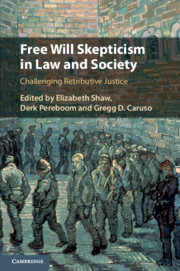Book contents
- Free Will Skepticism in Law and Society
- Free Will Skepticism in Law and Society
- Copyright page
- Contents
- Contributors
- Chapter 1 Free Will Skepticism in Law and Society: An Overview
- Part I On the Practical Implications of Free Will Skepticism
- Part II Alternatives to Retributive Punishment
- Part III Free Will Skepticism and the Criminal Justice System
- Chapter 8 Fichte and Psychopathy: Criminal Justice Turned Upside Down
- Chapter 9 Causality and Responsibility in Mentally Disordered Offenders
- Chapter 10 The Implications of Free Will Skepticism for Establishing Criminal Liability
- Chapter 11 Free Will Skepticism and Criminal Punishment: A Preliminary Ethical Analysis
- Index
- References
Chapter 10 - The Implications of Free Will Skepticism for Establishing Criminal Liability
from Part III - Free Will Skepticism and the Criminal Justice System
Published online by Cambridge University Press: 26 August 2019
- Free Will Skepticism in Law and Society
- Free Will Skepticism in Law and Society
- Copyright page
- Contents
- Contributors
- Chapter 1 Free Will Skepticism in Law and Society: An Overview
- Part I On the Practical Implications of Free Will Skepticism
- Part II Alternatives to Retributive Punishment
- Part III Free Will Skepticism and the Criminal Justice System
- Chapter 8 Fichte and Psychopathy: Criminal Justice Turned Upside Down
- Chapter 9 Causality and Responsibility in Mentally Disordered Offenders
- Chapter 10 The Implications of Free Will Skepticism for Establishing Criminal Liability
- Chapter 11 Free Will Skepticism and Criminal Punishment: A Preliminary Ethical Analysis
- Index
- References
Summary
This chapter discusses the implications of rejecting the notions of free will and retribution for the process of establishing criminal liability in a trial. It is a general principle of UK and American law that before a person can be convicted of a crime the prosecution must prove three things. Firstly, the accused must have performed the actus reus (the prohibited act). Secondly (with the exception of strict liability offences), the prosecution must prove mens rea, a mental state such as intention or recklessness. Thirdly, the accused must lack a valid defense, such as self-defense. This chapter argues that these prerequisites should be retained. It offers a rationale for these prerequisites that appeals to the value of liberty and moral communication but does not depend on the concepts of free will and retribution. This chapter then focuses on two defenses: self-defense and provocation. It argues that without these two concepts, the “right” to self-defense cannot be understood as a strong justification. Rather, self-defense involves permissible action. This chapter also argues that, without the concepts of free will and retribution, the partial defense of provocation cannot be based on the idea of justified anger but rather on understandable emotional distress.
- Type
- Chapter
- Information
- Free Will Skepticism in Law and SocietyChallenging Retributive Justice, pp. 192 - 206Publisher: Cambridge University PressPrint publication year: 2019

